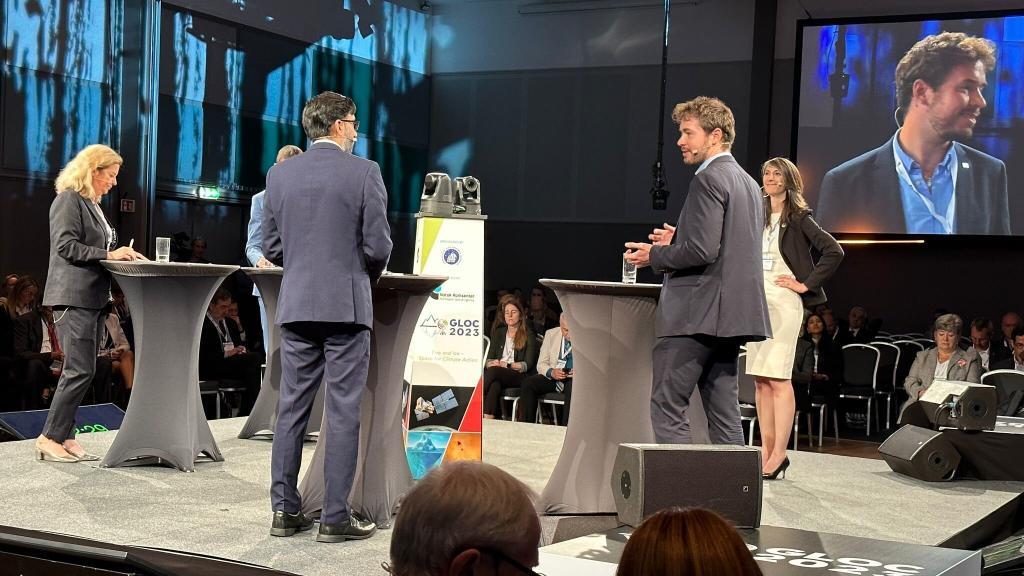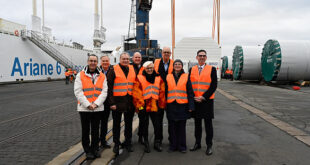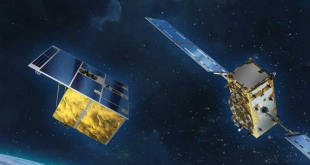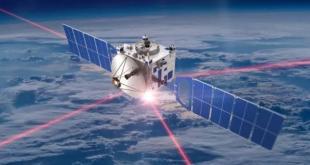By Tom Gardner

The Global Space Conference on Climate Change (GLOC 2023) arrived in Oslo last month; it was uncharacteristically interesting for a space conference. Not because it was overflowing with greatness, but because the bar for innovation and programmatic depth with space conferences has always tended to be quite low so the experience was unexpected.
However, as an event proactively designed to break down the silos between north and south, between the upstream and the downstream, and between climate talk and climate action, GLOC was ultimately a missed opportunity.
GLOC was not a global conference
The week in Oslo opened spectacularly with a gripping performance by Sami artist ISÁK. Each drumbeat crashed through the upholstering of our steel-framed seat and her voice smouldered the soul, consecrating the urgency of the conference’s theme. Despite the early thrills, the goose-bumping performance did not hide the lack of representation on show for long.
The Maldives was the only small, climate-vulnerable part of the world represented at the plenary-level. According to the International Astronautical Federation (IAF), 45 countries were represented at GLOC. However, only seven speakers were from outside Europe or North America. Six if you remove the hapless Azerbaijani representative’s promotional function for the controversial International Astronautical Congress in Baku later this year. With some creative accounting, only 22 countries were represented by speakers at plenary sessions.
A global conference demands pluralism. Most of our planet’s population, resources, and biodiversity resides south and eastwards, and global efforts on space for climate action need to rise to their rhetoric. Diverse representation breeds diverse perspectives. Climate-vulnerable communities and their champions have limited access to the privileged halls of international forums like GLOC, and if the sector wants to understand how best to optimise analytics and drive growth in data-as-a-service models, it must seek out prospective end users directly.
The industry will remain inward-looking and obscure in the chronically disengaged public limelight if it does not flex the clout of its capabilities.
Given the IAF’s network and extensive resources, it can do better to support Global South representation at ostensibly ‘global’ events. Of course, there were speaker no-shows—there always are—but only a bad workman blames their tools. A regional conference should not benefit from the pomp and prestige of marketing itself as global. That label is earned, not inherited. If key stakeholders from countries highly vulnerable to climate change’s impacts are not investing in a conference on space-for-climate action, something has gone wrong.
So, where can organisers do more? As someone outside the logistical process, I can only speculate but in short, proactively improve the incentives and reduce the barriers to attendance looking ahead. Invitational logistics should be mobilised sooner so that those who have the farthest to travel or who must navigate bloated bureaucracies are not left behind. Financial assistance for expensive accommodation and flights for delegates from middle-or lower-income countries, especially to a balance-devouring city like Oslo, would reduce the steep cost barriers that come with international visits. Finally, remove the need for speculation by publishing collated, anonymised feedback from no-shows so the space community can better understand the trade-offs people consider when deciding on their international commitments.
The stubbornness of space siloes
GLOC plenaries pre-ambled with the issue of the sector as a silo, a bubble—the other space vacuum. While awareness of the problem is always the important first step, the recurring presence of this realisation year-to-year does make it feel as though the talking point has hardened into a permanent fixture at space conferences.
Nonetheless, GLOC executed several refreshing sessions that benefitted from speakers with experience working in a range of different fields and places. Notably, from the Indian National Remote Sensing Centre (NRSC), the United Nations Office on Drugs and Crime (UNODC), the United Nations Food and Agriculture Organization (FAO), and the Global Alliance for Water and Climate. Some technical sessions did an excellent job grounding local contexts, such as a presentation exploring sea-level rise’s impact on small island nations like Tuvalu and another on the promise of mangrove monitoring in Angola.
However, in the plenaries the conference still tended to treat different national contexts as homogenous, preventing many discussions from reaching much-needed depth. A recurring statistic throughout GLOC was that around 80% of satellite data is unused. We cannot begin to understand this staggeringly underutilised resource without recognising that the constraints and opportunities for space data uptake are set as much by national as by international contexts.
Nuance here was lacking. Some countries are more or less centralised, one may have a thriving civil society that can act as the natural entry point for downstream engagement while another does not, a relevant ministry in one place may be corrupt or deeply dysfunctional while in another it might be the perfect gateway for climate action.
In practice, the result was a globalised projection of European and North American norms of personal freedoms, governance, and institutional agency which, while conversationally convenient, brought the space community a little closer to bridging gaps or understanding needs in other parts of the world.
Climate still plays second stage to politics
For all the improvements on the traditional IAF model, it was impossible to escape the elephant in the room: that GLOC 2023 was the “first-of-its-kind” should be a cause for worry, not celebration.
We are mere years away from the first recording of 1.5 degrees of warming compared to preindustrial levels; “first-of-its-kind” should have happened decades ago. Given space technology’s instrumental role in informing the accuracy and gravity of the threat facing humanity from global warming since the end of the 20th century, why did the industry not move sooner?
The sector’s public-facing posture likes to spotlight space applications such as MethaneSAT’s work on tracking methane emissions, disaster response optimisation using big data, or the amazing capabilities for monitoring illegal fishing or deforestation or, acts of war. Yet the myriad of announcements throughout the conference about a “disruptive” new science mission or the extraordinary power to track a single whale to alert nearby maritime traffic fails to reach the proportionality needed to face the astronomical scale of the climate challenge.
GLOC 2023 spent little time wrestling with the uncomfortable truth belatedly dawning at the yearly Conference of the Parties (COPs)—the climate is not in crisis because of methane leaks or illegal fishing, or because of bad apples or bad luck; it is a systemic crisis that is all-too legal and all-too unsustainable.
Space conferences need to flex more political muscle. As mentioned in the first day’s session on space communication, they ought to “court controversy”. The space-climate nexus is not above climate politics or responsibility. Thomas Marceau, Head of Sustainability and Corporate Support at ArianeGroup, shared a blunt observation on the final day. When speaking to younger generations, he said “the first question is about the impact, not about all the benefits space can bring.”
Yes, space solutions are tools, but we cannot pick and choose to platform technologies helping to fight climate change without also highlighting the sector’s complicity in the problem. The exponential increase in launches and constellations, coupled with novel rocket propellants and the unknown impact of re-entry particles, is not only polluting low-Earth orbit but also risks undoing ozone recovery.
The climate is not in crisis because of methane leaks or illegal fishing, or because of bad apples or bad luck; it is a systemic crisis that is all-too legal and all-too unsustainable.
Meanwhile, satellite data is also being used to perpetuate an extractive business-as-usual on the ground. Specialised Earth observation and connectivity capabilities have been key efficiency and exploration enablers in oil and gas operations, and as fisheries in the Indian and Antarctic Oceans face ecological collapse due to overexploitation and climate pressures, industrial fishing is leveraging satellite-enabled big data to optimise ‘smart’ operations that can more effectively hunt down diminishing hotspots of abundant fishery. GLOC focussed on ways to tackle Illegal, Unreported, and Unregulated (IUU) fishing, an important issue in the Maldives which loses between USD $9 million and USD $22 million from the practice each year. However, the 35% of global fisheries being overexploited and the 300,000 whales and other cetaceans killed every year as bycatch comes from perfectly legally, industrial fishing.
These are difficult, complex issues, and they prickle political sensitivities, but their absence made it hard to take the climate action fanfare during GLOC seriously. The sector should have the courage to politicise the space toolkit, to grapple more publicly with the wisdom of hockey stick projections for the sector instead of taking the merits of growth at face value, and to be prepared to leverage client and supplier relationships with those that fall short of the mark on climate credentials or sustainable sourcing and talk about these experiences in public.
GLOC can be a blueprint for success
Heaving the institutional conservatism of the IAF towards a dedicated climate direction was no mean feat and the Norwegian Space Agency deserves credit for their work in making GLOC happen and tremendous hospitality. Yet even as it tries to zero in on climate action, the space industry is proving agonisingly slow to rise to the greatest challenge of our time.
It is not that the ability to measure critical climate variables or monitor carbon footprint from space is not important or useful. These capabilities are fantastic; after all, what is measured can be managed. It is that the industry will remain inward-looking and obscure in the chronically disengaged public limelight if it does not flex the clout of its capabilities more muscularly and reflect more meaningfully on its own socio-environmental entanglements in forums like GLOC.
Herein lie the opportunities. IAF conferences have the extraordinary power to mobilise an entire industry to descend on the same city for a week. These multinational, multidisciplinary spaces hold radical potential, and for all its shortcomings, the improved standard set in Oslo last month will be a useful conference blueprint moving forwards. Was GLOC a success? Ultimately, that will depend on any concrete outputs which materialise as we head into COP 28 later this year.

Tom Gardner is currently the heading up strategic partnerships at the Maldives Space Research Organisation (MSRO), the first entity in the Maldives dedicated to the research and development of the space sector. He holds a masters degree in History and is currently pursuing a second masters at the University of Oslo exploring development and sustainability issues in contemporary Asia. Tom was part of the Steering Committee for the first Space for Island Nations Conference 2023 and is a new member of the recently formed Association of Space Entrepreneurs in the Indo-Pacific (ASEIP). He received a full scholarship from the European Space Agency to participate in the International Space University’s Space Studies Program 2022 and has a background in ESG consultancy and online media.
 SpaceWatch.Global An independent perspective on space
SpaceWatch.Global An independent perspective on space




